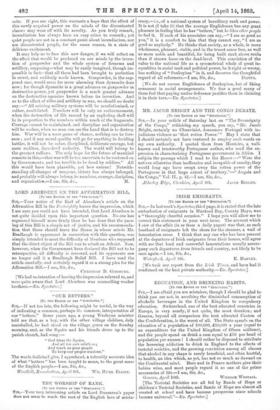THE DYNAMITE DANGER.
[TO THE EDITOR OF THE "Spircroyeir."]
SIR,—I understand your article of March 24th, on "The Dyna- mite Danger," to maintain that the sudden arising of this danger is not so much due to the newly increased intensity of political passions, as to the new fact of the invention of dyna- mite. If you are right, this warrants a hope that the effect of this newly acquired power on the minds of the discontented classes may wear off with its novelty. As you truly remark, incendiarism has always been an easy crime to commit ; yet quiet people are not in a constant panic about incendiarism, nor are discontented people, for the same reason, in a state of delirious excitement.
It may help us to face this new danger, if we will reflect on the effect that would be produced on our minds by the inven- tion of gunpowder and the whole system of firearms and artillery, supposing—what may be easily imagined, though im- possible in fact—that all these had been brought to perfection in secret, and suddenly made known. Gunpowder, in the sup- posed case, would seem far more alarming than dynamite does now; for though dynamite is a great advance on gunpowder in destructive power, yet gunpowder is a much greater advance on the destructive agencies known before its invention. And as to the effect of rifles and artillery in war, we should no doubt say :—" All existing military systems will be revolutionised, or rather, annihilated. Numbers will be only an embarrassment, when the destruction of life caused by an exploding shell will be in proportion to the numbers within reach of the fragments. Courage cannot be maintained, and discipline and organisation will be useless, whet' no man can see the hand that is to destroy him. War will be a mere game of chance, nothing can be fore- seen ; and if any moral quality will go for anything in deciding battles, it will not be sober, disciplined, deliberate courage, but mere reckless, dare-devil audacity. The world will belong to the greatest ruffians. The only hope for the future of mankind consists in this,—that war will be too uncertain to be ventured on by Governments, and too terrible to be faced by soldiers." All this would have been plausible, yet how untrue l Notwith- standing all changes of weapons, victory has always belonged, and probably will always belong, to numbers, courage, discipline, and organisation.—I am, Sir, &c., M.



































 Previous page
Previous page